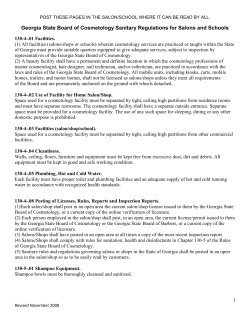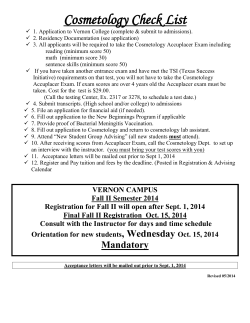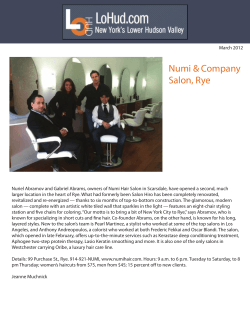
Cosmetology As A Career - Statewide Instructional Resources
Cosmetology As A Career Your Guide to Creating a Beautiful Future Table of Contents What is Cosmetology? ...................................... 2 Services Performed ...................................... 3 Hairstylist/Designer/ Barber........................... 4 Esthetician.................... 5 Nail Technician............ 6 Makeup Artist.............. 7 In the field of beauty, which jobs are in most demand? ........................ 8 How much does it cost to complete cosmetology school ............................ 9 Can I get financial aid? ..................................... 9 What does it mean if a school is accredited? .................................... 10 What does it mean to be a licensed cosmetologist? And how long does it take? .................................... 11 Education & Training ................................... 12 What are my career options after I complete cosmetology school? ........................ 13 How much can I expect to make as a professional cosmetologist? ............. 14 Environment ............... 15 What makes a successful cosmetologist? ............. 16 How do I get started? ... 17 Resources .................... 18 What is Cosmetology? The Merriam-Webster Online Dictionary defines cosmetology as, the cosmetic treatment of the skin, hair, and nails. Licensed cosmetologists provide a variety of personal services that help clients look and feel their best. These services primarily include the care and treatment of hair, nails and skin. Services can also involve consultations on health and wellness (such as diet and nutrition, fitness and health and wellbeing). Personal appearance is not only a key factor in keeping one’s morale high. A well-groomed appearance is also a factor in enhancing one’s chances for a successful career. A career in cosmetology means you will devote your talents to making others look and feel their best. A cosmetology license is necessary for pursuing a career as a hair stylist/ designer/barber, nail technician, esthetician or makeup artist. Licensing requirements vary from state to state for each area of expertise. 2 Services Performed The primary goal of a successful licensed cosmetologist is to create an experience for the client that he or she will enjoy and want to repeat. Cosmetologists keep pace with the fashion world and stand ready to meet the constantly changing career skills vital to success. Today’s cosmetologists must possess, and continually upgrade and refine, a wide range of skills to meet the needs of a diverse clientele. Continuing education is a must! Cosmetology offers opportunities for personal growth and many career options. 3 HairStylist/ Designer/Barber Because hair comes in many different lengths and textures (curly, wavy or straight), a licensed cosmetologist must be able to “prescribe” the appropriate style and treatment for each individual client. The services most typically performed by hair stylists/designers/barbers include, but are not limited to, shampoo, hair treatment (condition/color/perm), haircut or trim, hairstyle and finish. In addition, barbers typically offer facial shaves and trims (beard, moustache, eyebrows, etc.) to male clients. Hair stylists/designers/barbers also perform scalp treatments and must be adept at using a wide variety of products (shampoos, conditioners, perms and relaxers, aromatherapy oils, hair color, to name a few) and tools (combs, brushes, scissors, razors, curling aids, dryers, to name a few). Hair stylists/designers/barbers must be able to recognize abnormalities in the hair and scalp and recommend effective treatments to treat and possibly correct those abnormalities. Effective hair stylists/designers/barbers must also be able to communicate well in order to establish, build and maintain a trusting relationship with each client. One also needs to be well organized and a team player. 4 Esthetician As one of today’s fastest-growing segments of the salon and spa industry, estheticians perform facials, hair removal and other body treatments such as massage. They must be adept at using a wide variety of products (cleansing agents, lotions, wraps, oils, to name a few) and tools (lighted mirrors, steam machines, saunas and spas, rinsing apparatus, to name a few) in order to provide the client with a positive experience. Estheticians must be able to recognize abnormalities in the skin and recommend effective treatments to correct those abnormalities. Estheticians must also be able to communicate well in order to establish, build and maintain a trusting relationship with each client. One also needs to be well organized and a team player. 5 Nail Technician (Manicures & Pedicures) Hand treatments include, natural nail and nail enhancement manicures and typically involve treatment of the cuticles. Nail technicians must be adept at using a wide variety of products (nail enamel, polish remover, cuticle remover/cream, aromatherapy oils, to name a few) and tools (manual or electric files, buffers, cuticle pushers and nippers, to name a few). In addition, nail technicians typically perform a variety of hand treatments such as paraffin dips and massage. Nail enhancement treatments typically involve the application of synthetic nails atop the client’s natural nail and require the use of special adhesives, which must be handled correctly. Pedicure treatments typically involve soaking and buffing the feet and trimming, smoothing, treating and polishing/ finishing the toenails. Performing this service may also involve massage and consultation (nail technicians must be able to recognize abnormalities in the nail and recommend effective treatments to correct those abnormalities). Effective nail technicians must also be able to communicate well in order to establish, build and maintain a trusting relationship with each client. One also needs to be well organized and a team player. 6 Makeup Artist Makeup artists perform artistic services in a variety of settings such as, but not limited to, salon/spa client makeup application and model makeup application for photo shoots and platform presentations. 7 According to the United States Department of Labor, employment of hairdressers, hairstylists, cosmetologists, skin care specialists, and shampooers is projected to grow between 10-20 percent through year 2010 and employment of manicurists and pedicurists is expected to increase 21-35 percent over the same period. In the field of beauty, which jobs are in the most demand? 8 How much does it cost to complete cosmetology school? Costs really depend on each school and their location. A school in or near a major metropolitan city will likely cost at least $10,000 to $15,000 for a full cosmetology program. The same program in a more rural setting could be as low as $6,500. If you are planning to complete a program to become a certified Esthetician or Nail Tech, this will cost more in the range of $3,000 to $10,000 depending on the program requirements and location of the school. Also remember to factor in the cost of your student kits and supplies when looking at the cost to obtain your license. Can I get financial aid? Many schools offer various forms of financial aid. You will want to meet with the school’s financial aid office to find out what is available based on your needs and financial situation. Schools that are members of the American Association of Cosmetology Schools (AACS) also have scholarships and grants available. Visit www. careersinbeauty.org to see a list of member schools. 9 Schools that have been accredited have met specific academic and institutional requirements established by an accrediting organization. Some factors accrediting organizations review include curriculum, quality of instruction, facilities, staff and admissions policies. One reason a school will become accredited is to begin the process required by the US Department of Education to become eligible to offer Title IV government funding to students. Accreditation is a school’s choice and there are many good cosmetology schools that simply choose not to go through the accreditation process. What does it mean if a school is accredited? 10 What does it mean to be a licensed cosmetologist? And how long does it take? All states require cosmetologists to be licensed and requirements vary from state to state. Typically, in addition to having a high school diploma, you must meet an age requirement and pass a medical exam. In addition, you will be required to complete a designated number of hours of instruction and practice at a licensed cosmetology school. You must take a State Board examination and pass in most states both written and practical tests, administered by a State Board of Examiners. All states accept completion of a state approved cosmetology course as adequate preparation for this exam; some states may accept an apprenticeship. It is up to you to find out what is required in your state, including the requirements for renewing your license (typically annually or every two years). Lastly, should you relocate to another state after receiving your cosmetology license, find out what the requirements are for licensure in the new state. There are three factors that will determine how long it will take you to complete a program: the program(s) you take, your state’s hour requirement and whether you enroll as a part time or full time student. A full cosmetology program is the most comprehensive and requires the most hours. The national average is between 1,400 to 1,600 hours. The national average for Nail Technology is between 300 to 600 hours; Electrologist is 500 hours; and Esthetics is between 600 to 900 hours. Check with your state licensing board for the required number of hours. As a full time student, many full cosmetology programs can be completed in less than two years while some of the shorter programs (nail technology, esthetics) can be completed within six months. 11 Educational requirements vary both by state and with the individual schools. In some states, one must be a high school graduate in order to apply for a cosmetology license. In others, a GED is acceptable. If you do not yet have a high school diploma or GED, it is possible that you can be accepted into cosmetology school as long as you are pursuing your diploma or GED at the same time. To be sure, find out the requirements from your local cosmetology school and/or your State Board of Cosmetology. Education & Training Cosmetology courses are offered in some public high schools, vocational and technical schools, community colleges and private schools. Tuition fees vary widely, as do the minimum hour requirements. Required hours vary from 1,000 to 2,100 hours depending on the state in which you train and depending on whether you attend full- or part-time, it can take anywhere from six months to two years to complete your education. Be prepared to take classes in anatomy, physiology, hygiene, infection control, chemistry and other technical and business-related courses. Other studies and training may include various hairstyling techniques, permanent waving, chemical relaxing, hair color, scalp treatments, esthetics, makeup application, manicuring and pedicuring and the care and styling of wigs and hair extensions. Business-building classes could include professional ethics, sales techniques and more. While in school, you will most likely begin training on mannequins, then graduate to models and clients (many schools have working student salons/ spas that are open to the public). At some point during your education and subsequent employment, you may also be invited (or required) to perform a certain amount of community service. 12 There are a wide variety of professional careers you can pursue after graduating from a cosmetology school. For hairstylists/ designers, the typical career path begins with an entry-level salon/spa position and gradually, service by service, work your way up the levels. Many chain salon organizations have career path opportunities that lead to management of several salons. Depending on the salon/ spa, you could work your way to Master Stylist, Artistic Director or even Owner! While still in cosmetology school or upon graduation, seek employment at a salon or spa that offers acceptable compensation, benefits, education, training and opportunities for advancement. Keep in mind that one of your responsibilities will be active participation within dynamics and salon life in order to help the business grow (it’s not just about you). When interviewing with a salon owner, have as many of the fine points explained to you as possible. These include a detailed job description, training schedule, amount of time each week devoted to mentoring, and amount of one-on-one training. Ask, too, about the levels you will need to master in order to advance and how long mastering each level could conceivably take. What are my career options after I complete cosmetology school? Your cosmetology license can take you in many directions, depending on the depth of your passion for your career and craft and how much you are willing to invest in continuing education. You can build a loyal clientele, help your team succeed, help the owner grow the business and become involved in competitions, photo shoots, trade show and industry platform presentations, educational presentations and more. Should you desire, you can become affiliated with a distribution or manufacturing firm and assist them with education, product training, marketing, sales and more. Also, should you desire, you can own your own salon/spa. Plus, no one is stopping you from trying to build a career in the entertainment industry–television programs, music videos and movies could not be made without the skills of hairdressers, nail technicians and makeup artists! Like any career, in order to be successful, one must have ambitions and pursue goals in a methodical and ethical manner. 13 Earnings vary with level of experience, geographic location and policies set forth by the employer. Become fully educated with regard to these policies. For example, does the salon/spa pay straight salary? Salary plus commission? Or, is the business a booth rental operation, in which case you may be classified as an independent contractor rather than an employee? If so, what are the requirements in your state and what will be required of you in terms of working in this environment? According to both the National Accrediting Commission of Cosmetology Arts and Sciences (NACCAS) and the United States Department of Labor, salon professionals can average up to $50,000 including tips. The 2003 NACCAS Job Demand Survey reveals that cosmetologists have dramatically increased their earning power today with zero unemployment due to the severe shortage of licensed salon professionals. Some of the main factors that determine income include the size and location of the salon, hours worked, the tipping habits of clients and competition from other salons and shops. A cosmetologist’s ability to bring in and maintain regular clients is another factor in determining potential earnings. According to The United States Department of Labor, many cosmetologists and other personal appearance workers receive commissions based on the price of the service, or they earn a salary based on hours worked. Nearly every professional in the cosmetology industry receive tips and commissions for the products they sell. Some salons pay bonuses to employees who bring in new business. How much can I expect to make as a professional cosmetologist? 14 You should accept nothing less than optimum working conditions. The salon/ spa/barbershop should be immaculate, well ventilated and adequately lit. You will share in the responsibility of keeping all areas, not just your personal workspace, neat and clean. And, you will be responsible for the proper sanitizing of all your tools and implements after each use. Be sure you fully understand the procedures and policies required by your employer. This includes but is not limited to schedule, education and training, record keeping, code of ethics, dress code, retail sales and sanitation. Environment Your job will most likely require the use of chemicals, many of them harsh. Be sure to receive adequate product knowledge and training in the proper use and application of all chemicals. Your job may also require you to stand for long periods of time. Be sure to learn how you can protect yourself from fatigue and other potential work-related injuries. The hours you will be required to work will, for the most part, depend on the needs of the business and applicable legal standards. Be sure you understand the requirements. 15 In order to be a successful cosmetologist, you must enjoy interacting with diverse people. You must be aware of your clients’ preferences and respectful of any special needs they may have. You must be a good listener, possess the ability to follow instructions and have confidence in your talent, abilities and ideas. As mentioned previously, you should be able to tolerate the long intervals of standing (as well as repeated bending) required to perform this work and exposure to the chemicals necessary for performing services in a salon/spa/barbershop. And, as previously mentioned, you must be comfortable in a team setting and understand what it takes to work with a group of peers toward a common goal. You must also continue to work to develop your skill sets and build a clientele in order to grow and advance your career. This includes staying updated on the latest products and developing your sales techniques to recommend products and services that will meet your clients’ needs and keep them coming back to you. What makes a successful cosmetologist? 16 How do I get Started? Your first step is to find out the requirements in the state you would like to attend cosmetology school. Research schools you would like to attend and visit them to get a feel for the type of education you will receive. 17 Resources Before you do anything, you may first want to communicate with someone (parent, sibling, other family member, guidance counselor, teacher, mentor, etc.) who can help you explore all of your educational and career options and guide you in the direction that is best for you. Next, you may conduct research by communicating with the following associations and publications. Online www.careersinbeauty.org Established by the American Association of Cosmetology Schools to inform students of news, events, scholarships and more in the field of cosmetology careers. Books “Success Without College” by Linda Lee. College may not be right for your child or right just now. Available through amazon.com. “The Uncollege Alternative” by Danielle Wood. A guide to incredible careers and amazing adventures outside college (chapter 11 is devoted to the beauty industry). Published by HarperCollins, New York, NY. Available through amazon.com. 18 American Association of Cosmetology Schools 15825 North 71st Street, Ste. 100 Scottsdale, Arizona 85254 800.831.1086 Fax 480.905.0993 info@careersinbeauty.org www.careersinbeauty.org
© Copyright 2025










